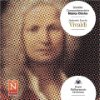Album Releases  view
view
 2022 - Sixteen Seasons
2022 - Sixteen Seasons
 2011 - Sinfonie d'opera
2011 - Sinfonie d'opera
 2010 - Grandes Compositores de la Música Clásica: Vivaldi
2010 - Grandes Compositores de la Música Clásica: Vivaldi
 2010 - Les Quatre Saisons (Direction : Jonathan Carney)
2010 - Les Quatre Saisons (Direction : Jonathan Carney)
 2005 - The Four Seasons
2005 - The Four Seasons
 2003 - Las Cuatro Estaciones, Op. 8
2003 - Las Cuatro Estaciones, Op. 8
 2002 - Concerti e Trii per liuto e archi
2002 - Concerti e Trii per liuto e archi
 1995 - La Stravaganza
1995 - La Stravaganza
 1984 - Four Violin Concertos
1984 - Four Violin Concertos
 1984 - Klassik für Millionen: Die vier Jahreszeiten
1984 - Klassik für Millionen: Die vier Jahreszeiten
 1984 - Flötenkonzerte (Gabriele Ferro)
1984 - Flötenkonzerte (Gabriele Ferro)
 1984 - The Four Seasons
1984 - The Four Seasons
 1983 - An Isaac Stern Vivaldi Gala (Isaac Stern; David Oistrakh; It
1983 - An Isaac Stern Vivaldi Gala (Isaac Stern; David Oistrakh; It
 1983 - Le Quattro Stagioni (I Solisti Veneti feat. conductor: Claud
1983 - Le Quattro Stagioni (I Solisti Veneti feat. conductor: Claud
 1983 - The Four Seasons
1983 - The Four Seasons
 1982 - The Four Seasons (The Academy of Ancient Music feat. conduct
1982 - The Four Seasons (The Academy of Ancient Music feat. conduct
 1982 - Le Quattro Stagioni (The English Concert feat. conductor: Tr
1982 - Le Quattro Stagioni (The English Concert feat. conductor: Tr
 1982 - The Four Seasons (The Scottish Chamber Orchestra feat. Violi
1982 - The Four Seasons (The Scottish Chamber Orchestra feat. Violi
 1981 - Vivaldi: The Four Seasons (St. Paul Chamber Orchestra feat.
1981 - Vivaldi: The Four Seasons (St. Paul Chamber Orchestra feat.
 1981 - Le quattro stagioni (London Symphony Orchestra feat. violin:
1981 - Le quattro stagioni (London Symphony Orchestra feat. violin:
 1981 - Serenata a tre (Clemencic Consort feat. conductor: René Cle
1981 - Serenata a tre (Clemencic Consort feat. conductor: René Cle
 1981 - Cello Concertos
1981 - Cello Concertos
 1979 - Oboe Concertos (feat. oboe: Han de Vries)
1979 - Oboe Concertos (feat. oboe: Han de Vries)
 1978 - Violin Concerti Nos. 5-12, Op. 8 / Flute Concerto in D major
1978 - Violin Concerti Nos. 5-12, Op. 8 / Flute Concerto in D major
 1977 - Il cimento dell'armonia e dell'inventione: Concerti, Op. 8,
1977 - Il cimento dell'armonia e dell'inventione: Concerti, Op. 8,
 1977 - Čtvero ročních dob
1977 - Čtvero ročních dob
 1972 - Lute (Guitar) Concertos / Mandolin Concertos
1972 - Lute (Guitar) Concertos / Mandolin Concertos
 1969 - Le Quattro Stagioni
1969 - Le Quattro Stagioni
 1963 - 12 Concertos Op. 4 "La Stravaganza" (I Musici)
1963 - 12 Concertos Op. 4 "La Stravaganza" (I Musici)
Members
 1 Male
1 Male
Origin
 Italian
Italian
Genre
 Composer
Composer
Style
 Classical
Classical
Mood
---
Born
Origin
Genre
Style
Mood
---
Born
![]() 1678
1678
Active![]() ---
---![]() 1741
1741
Cutout![]()
Alternate Name
Vivaldi
No loved tracks found...
Artist Biography
Available in:
Antonio Lucio Vivaldi (4 March 1678 – 28 July 1741), nicknamed il Prete Rosso ("The Red Priest") because of his red hair, was an Italian Baroque composer, Catholic priest, and virtuoso violinist, born in Venice. Recognized as one of the greatest Baroque composers, his influence during his lifetime was widespread over Europe. Vivaldi is known mainly for composing instrumental concertos, especially for the violin, as well as sacred choral works and over forty operas. His best known work is a series of violin concertos known as The Four Seasons.
Many of his compositions were written for the female music ensemble of the Ospedale della Pietà, a home for abandoned children where Vivaldi had been employed from 1703 to 1715 and from 1723 to 1740. Vivaldi also had some success with stagings of his operas in Venice, Mantua and Vienna. After meeting the Emperor Charles VI, Vivaldi moved to Vienna, hoping for preferment. The Emperor died soon after Vivaldi's arrival.
Though Vivaldi's music was well received during his lifetime, it later declined in popularity until its vigorous revival in the first half of the 20th century. Today, Vivaldi ranks among the most popular and widely recorded of Baroque composers. Antonio Lucio Vivaldi was born in 1678 in Venice, then the capital of the Republic of Venice. He was baptized immediately after his birth at his home by the midwife, which led to a belief that his life was somehow in danger. Though not known for certain, the child's immediate baptism was most likely due either to his poor health or to an earthquake that shook the city that day. In the trauma of the earthquake, Vivaldi's mother may have dedicated him to the priesthood. Vivaldi's official church baptism did not take place until two months later.
Vivaldi's parents were Giovanni Battista Vivaldi and Camilla Calicchio, as recorded in the register of San Giovanni in Bragora. Vivaldi had five siblings: Margarita Gabriela, Cecilia Maria, Bonaventura Tomaso, Zanetta Anna, and Francesco Gaetano. Giovanni Battista, who was a barber before becoming a professional violinist, taught Antonio to play the violin and then toured Venice playing the violin with his young son. Antonio was probably taught at an early age, judging by the extensive musical knowledge he had acquired by the age of 24, when he started working at the Ospedale della Pietà. Giovanni Battista was one of the founders of the Sovvegno dei musicisti di Santa Cecilia, an association of musicians.
The president of the Sovvegno was Giovanni Legrenzi, an early Baroque composer and the maestro di cappella at St Mark's Basilica. It is possible that Legrenzi gave the young Antonio his first lessons in composition. The Luxembourg scholar Walter Kolneder has discerned the influence of Legrenzi's style in Vivaldi's early liturgical work Laetatus sum (RV Anh 31), written in 1691 at the age of thirteen. Vivaldi's father may have been a composer himself: in 1689, an opera titled La Fedeltà sfortunata was composed by a Giovanni Battista Rossi - the name under which Vivaldi's father had joined the Sovvegno di Santa Cecilia. "Rosso" is Italian for "Red", and would have referred to the colour of his hair, a family trait.
Vivaldi's health was problematic. His symptoms, strettezza di petto ("tightness of the chest"), have been interpreted as a form of asthma. This did not prevent him from learning to play the violin, composing or taking part in musical activities, although it did stop him from playing wind instruments. In 1693, at the age of fifteen, he began studying to become a priest. He was ordained in 1703, aged 25. He was soon nicknamed il Prete Rosso, "The Red Priest", because of his red hair. Not long after his ordination, in 1704, he was given a dispensation from celebrating Mass because of his ill health. Vivaldi only said Mass as a priest a few times. He appears to have withdrawn from priestly duties, but he remained a priest.
Wide Thumb
Clearart
Fanart


Banner

User Comments
 No comments yet..
No comments yet..

 60%
60%